Forgotten battalion of black women celebrated in film
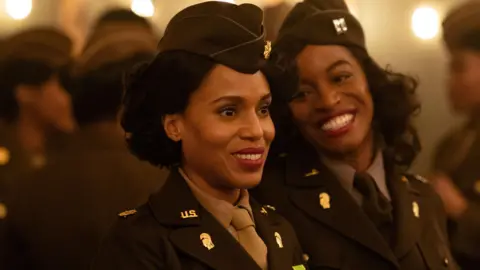 Netflix
NetflixThey were given a task others had failed - and they were given it because they were not expected to succeed.
The intriguing story of 855 black women who came to Birmingham from America to solve a two-year postal backlog during World War Two - handling 17 million letters that would have otherwise gone unseen - has been made into a film.
"Ladies, we have been ordered to provide hope and communication and care packages to our exhausted soldiers on the front line, and to let their families back home know if they are safe," says Major Charity Adams as she addresses her female soldiers in The Six Triple Eight.
"Or … or if they have died in battle."
Major Adams, who led the 6888th Central Postal Directory Batallion, is played by actress Kerry Washington.
"Everybody thought it was impossible, what they were up against," she told the BBC.
"And I think that's why the film resonates with people.
"Not just, you know, these particular black women and this time and place, but anybody who'd ever felt under estimated, or doubted, or pushed aside or marginalised."
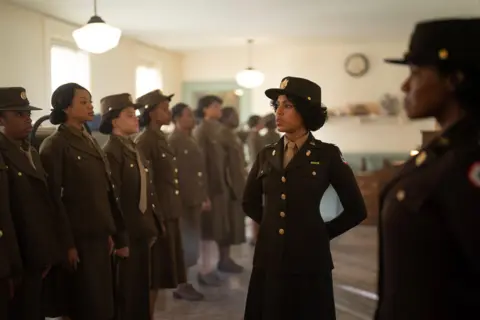 Netflix
NetflixCritically-acclaimed director and writer Tyler Perry has created the film for Netflix, bringing the women's achievements to a global audience.
"They were tasked with delivering 17 million pieces of mail that had been just thrown into hangers, that had been mouldy and a lot of the names on the letters were illegible," he said.
Viewers are left in no doubt about the challenge the women faced and the fact that others had failed the same mission.
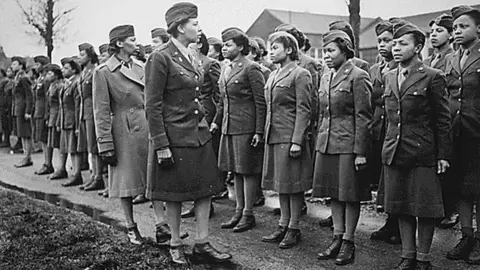 US National Archive
US National ArchiveMajor Adams declares in the film: "They have only given us a six-month ticking clock and I thought that was a long time until I realised the magnitude of this situation.
"When there is no mail there is low morale."
They were the first and only Women's Army Corps unit of colour to be stationed in Europe during World War Two.
The battalion was mostly black women but there were also women of Caribbean and Mexican descent.
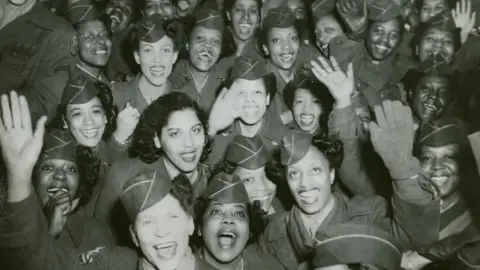 US Army
US Army"There's that great line that Tyler has written for Charity Adams in the film where she says, 'we are fighting a war on every front,'" Washington said.
"Because it just felt like, yes they were dealing with World War Two but they were also dealing with racism and misogyny.
"And even when they came back home they were dealing with people being prejudiced against them because they went into the army and people couldn't believe that they had accomplished this incredible goal, so there were rumours that they had only been sent there to be concubines for the black male soldiers.
"So that's why a lot of the women never talked about their legacy, didn't share this heroic moment in history with anybody."
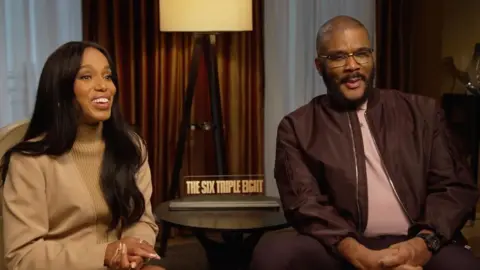
In 1945, the late Elizabeth Barker Johnson was 25 when she was based in the 6888's temporary barracks at King Edwards School in Edgbaston.
She spoke to the BBC when she was 98, in 2018.
"Separating the mail I picked up a package," she said.
"Everything fell out on the floor and I picked up that watch, I looked at the back of it, it had a man's name, his number and everything on it and it just made me feel so good because I could forward it to him."
Families of the 6888th Central Postal Directory Battalion visited King Edwards School last year, retracing their steps.
One of their descendants, Janice Martin, said at the time: "All I knew is she was in the military.
"She served, she said we had a job to do and we came home and nobody ever said anything more after that until these last few years."
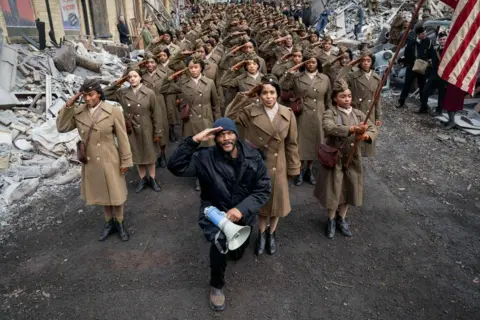 Netflix
NetflixThe women cleared the backlog in three months - half the time they'd been given.
Charity Adams was the first black woman to command an overseas battalion in the US Army.
Washington said she was full of admiration for the character she plays.
"People talk about loving her, respecting her because even though she was strict and stern and tough they knew that she wanted the best for them and that she loved them," she said.
"And I think that's such a unique leadership quality, the kind of leader who brings out the best in you because they believe in the best in you."
The 6888 film is released on Netflix on Friday, December 20.
Follow BBC Birmingham on Facebook, X and Instagram. Send your story ideas to: [email protected]
